Having predators in your region will lead to several different benefits for us humans! Keeping them around might actually do us a lot of goods
Most humans have a fearful relationship with the local predators, either as a direct fear of getting attacked, or more indirect fear of having our farm animals, pets or even children attacked. It’s no doubt a much heated debate that often gets pushed in both directions with the use of emotions rather than science, which is understandable when people are afraid. In this post I want to take a look at the benefits of having predators around in the modern society, which are many more than most people assume. Hopefully this will open the eyes to some of you as to why we should not just kill all predators in order to feel more safe. As it turns out, we might actually be more safe with predators around us in certain regions!
I know this is a heated debate, but I would be very happy if we could keep the discussion in the comment section to the actual post today. We have discussed whether or not to kill/regulate predators many times in the past, so let’s try to not focus solely on that today.
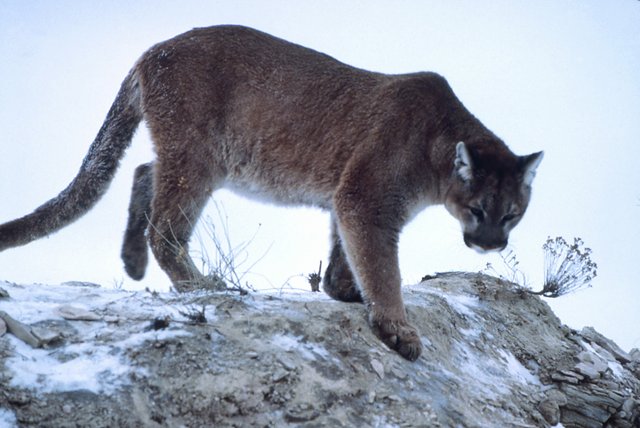
Having cougars in your region will actually improve your life! Image is Public Domain.
Some of the benefits of having predators around
The basis for this entire post is from a newly published article in Nature ecology & evolution. This is a metastudy (a study that organizes the results from many different studies into a paper to explain a certain phenomenon) of benefits of predators from all around the world, and mostly on how having predators around were beneficial to humans who lived in the area. So, let’s take a look at some of the major benefits of having predators around!
Having predators around prevent disease
The leopards (Panthera pardus) in India are directly saving lives by preying on feral dogs. The current population of leopards in India are able to kill 1,500 feral dogs very year, which is expected to save roughly 90 humans life annually by these 1,500 dogs not spreading rabies or attacking humans directly! It is important to remember that leopards can also attack humans, but the scientists believe that more humans will survive with leopards around compared to having feral dogs around. The leopards are helped by the Old World vulture birds (Gyps spp.) that feeds on the feral dogs and help control the spread of rabies.
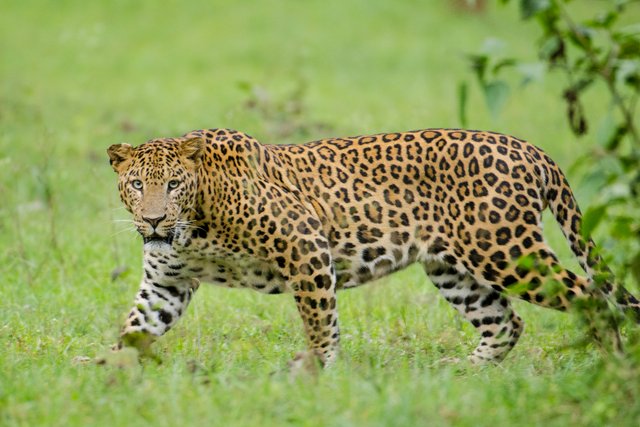
Photo of an Indian leopard. Image by Srikaanth Sekar, posted with the Creative Commons Attribution-Share Alike 2.0 Generic license.
The red fox (Vulpes vulpes*) prevents the spread of Lyme disease, a disease carried by ticks and can be very problematic for humans. This is happening because the red foxes kill rodents and other small mammals that spread the ticks. The larvae of amphibians also prevent disease by feeding on mosquitoes that carry the agents of malaria. This has only been proven in lab conditions, but it is expected that they are partially responsible for keeping mosquito populations under control in the wild as well.
These are the four major predators that have been studied and found to be linked to lower rates of disease for humans, but it is expected that there are many more examples of this in the wild! Insects, rodents and other small animals are often responsible for the spread of disease, so any predator to keeps these animals at bay will definitely prevent the spread.
Some predators increase agricultural output
This is most likely the most well-known example of benefits from having predators around, and this is why farmers without any animals (but with crops) tend to love having predators such as raptors around their farm.
I was actually touching this topic a week ago, when I wrote about how endangered owls in California are being poisoned by pot farmers. What the owls does is that they kill huge amount of rodents in farming areas, and are potentially saving the farmers a lot of money with rodent control mechanisms. The New Zealand falcon in does the same thing by killing small animals that feeds on the crop. In Australia, the dingo helps cattle farmers by killing kangaroos , which can be a problem for some cattle farmers.
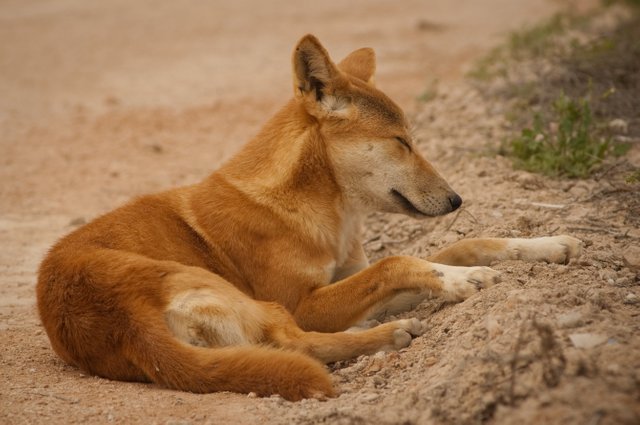
A dingo (Canis dingo) will prevent areas from getting too populated with kangaroos. Image by Henry Whitehead, posted with the Creative Commons Attribution-Share Alike 3.0 Unported license.
Hyenas remove dangerous organic waste
Some of the hyena species are strong scavengers (while some of them only eats termites), which is an important ecological function that helps remove dangerous organic matter. There haven’t been any very good studies on this, but areas with hyenas have shown to have better water quality since they eat a lot of organic matter that would otherwise contaminate the local water source.
The cougar might save your life (indirectly)
A final examples of how some predators can be of benefit to us humans is how having them around could keep us safer when driving a vehicle. If the Eastern USA were to let cougars (Puma concolor) recolonize the area, they would be preying on species of deer. This would in turn reduce the amount of collisions with deer, and 30 years after the recolonization the scientists expect the cougars to save over 155 human lives, as well as prevent over 21,000 injuries!
We are aware of this ecological function in other parts of the world as well, and here in Norway we do rely on our predators to kill deer in certain areas in order to keep their population levels healthy.
Thanks for reading
I hope you enjoyed learning about why it can be beneficial to keep predators in your region, and I’m sure there are also other benefits to keeping them alive. It’s important to have these things in mind when debating about the predator population reduction that is happening all over the world these days. If you want to take a closer look, then check out the link at the top of the post. Anyway, thanks for reading!
Wow, what a fabulous article. I wish we still had wolves in the UK. Ours became extinct in the 1800s but last year, a wildlife organisation bought a small pack for a private estate I believe with the aims of eventually getting the government to reintroduce them if there is space available. UK is so small that there is very little wilderness left apart from the remote areas of Scotland.
They did a similar thing with beavers a couple of years back and we now have a small but thriving population. The UK has very little wildlife left due to the industrial revolution and de forestation.
Sad really :-(
http://www.telegraph.co.uk/science/2017/06/30/wolves-brown-bears-could-return-british-countryside-naturally/
This is the article is was looking for !! Just to illustrate your point further, it seems the UK now has a massive deer population which is threatening crops and woodland! Nature always seems to know best.
Oh wow, that's interesting! I had no idea that this group also wanted to reintroduce predators to the UK. I'm excited to see how this project turns out!
Thanks for leaving such a good comment, @nathen007! I actually wrote a post about the reintroduction of beavers to the UK some time ago, so I'm familiar with it. If I remember correctly, lots of people opposed it, which is pretty much what happens most places where species are reintroduced.
We did actually wipe out all the wolves in Norway in the 1800s as well, but luckily our neighbors in Russia did not, so we got some strays that eventually established a new population.
It's very sad that there's no wilderness left in the United Kingdom. It's obviously way too late to do anything about it anymore, but at least it should be a warning for other nations who are ramping up their deforestation.
I agree, but this is a discussion I have with friends in Asia often. I cannot blame them for deforestation and their rapid industrial rises, after all, in Europe, and particularly the UK, we are reaping the huge benefits from our industrial revolution, and now other nations are catching up and developing and pulling themselves out of poverty, it seems a bit hypocritical for the currently developed nations to say 'don't do that', especially as we were the protagonists in the history of environmental damage.
It's a delicate situation which in my opinion should be addressed by us giving them both financial and scientific aid to help them progress in a cleaner and more environmentally friendly way than we did without sounding condescending. Tough balancing act !
Yeah, it's a really complicated situation. I also think the best way to solve it is to incentivize green development in order for these countries to have development that is not as harmful to the environment, by providing money and scientific help. I get why it feels unfair some these countries that the (now rich) industrial countries were "allowed" to not care about the environment back in the days while they have to answer for it, but at the same time our knowledge of why it was so bad has increased a lot, so these days we know how bad it is for a country to become industrialized.
What? I've never thought that predators could benefit us in any way. That's pretty interesting. Do you know if the wolves in Norway has any benefits for us, like the ones you've mentioned here?
Thank you for broadening my perspective. Ha en fin dag!
Hi, @susanne.
I don't think the Norwegian wolves provide any real benefit to us humans to be honest, mainly because they are so few and scattered. Most scientists consider them functionally extinct, meaning that they are so few that they have no effect on the ecosystem. They could have some effect on the local density of roe deer (rådyr), but hunters are generally able to manage these populations themselves. So I don't think this argument can be used in favor of keeping the wolves around. However, I don't think there has been a study on the positive effects of the Norwegian wolves, so I could of course be wrong with what I'm writing.
Best regards from @valth :)
It is all about the balance.
Every thing serves his purpose in the ecosystem, of course predictors included.
From another point of view, we humans are the worst predictors that ever lived on this planet.
So labeling some specie as predatory should not grant permission to hate and hunt ruthlessly.
e.g If a wild cat is hunting your domestic animals, she is not doing this for pleasure instead she may be doing so to feed her kids....So why we should hunt/hate her.
I think on the topic of predictors emotions cloud the better human logical judgement.
Yep, you are absolutely right!
I love it when nature documentaries show this. At first you see a big lion or another predator kill a poor little gazelle, and everyone gets upset at the lion. In the next scene you see her feeding it to the cure little cubs, and suddenly everyone is okay with it after all.
I never thought that predators are so beneficial for us. GOD made this world beautiful and maintain balance by eco system.
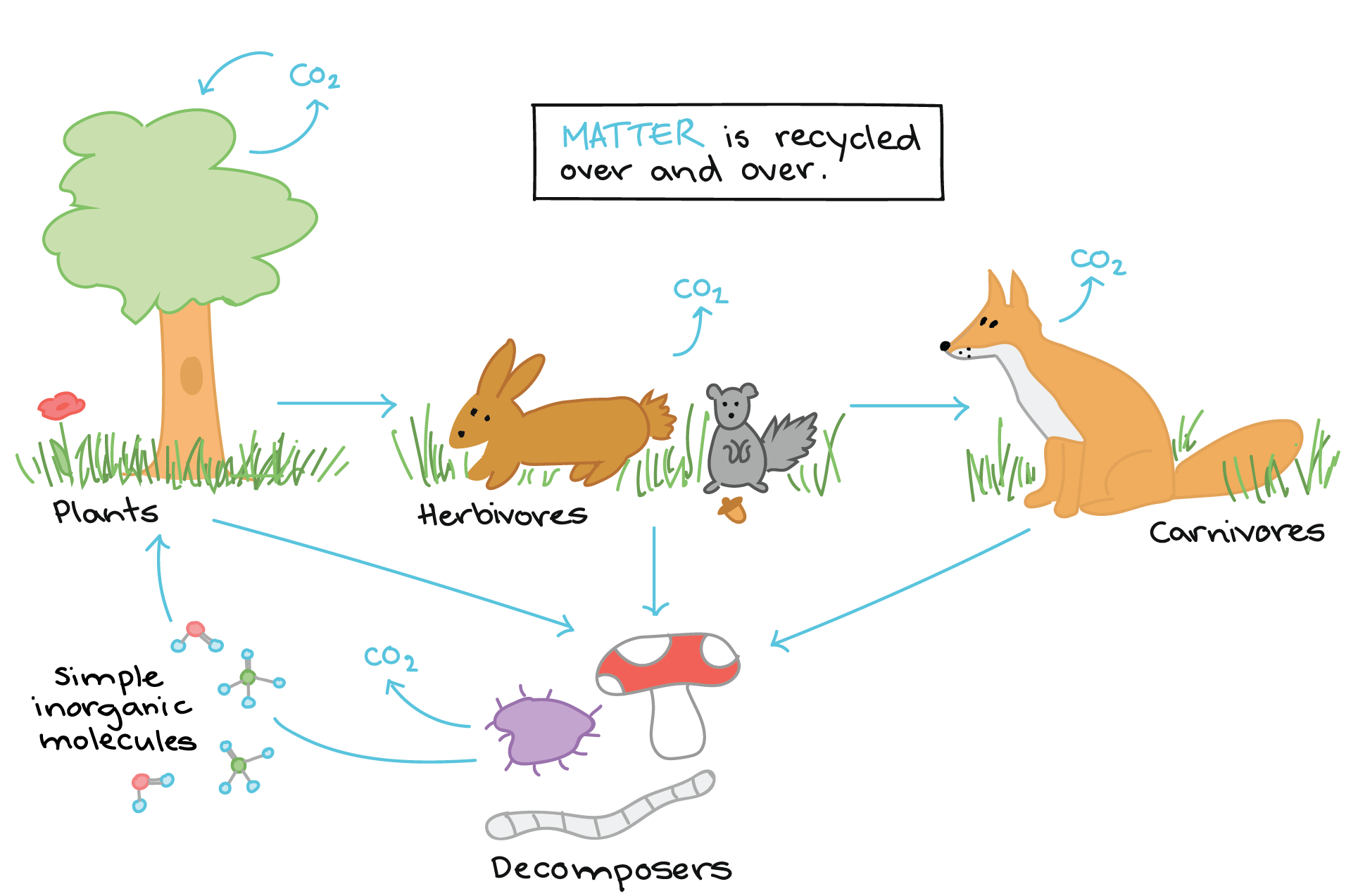
Killing all the predators is not a good idea, as it will certainly disturb the eco system. Disturbing eco system means more disease and less food which is not a good idea at all. In my opinion human life is more important than animal life. we can't compromise on human life. so these predators should be controlled in such away that it's impact on eco system in minimum and it's only possible when people don't brutally kill the predators for their enjoyment.
I agree 100 %. Killing all of them will have huge consequences for the local ecosystem!
But we also need to differentiate between how humans feel about being scared of predators, versus how dangerous they actually are. Here in Norway most of our wild wolves are shot, and when conservationists oppose this, the people who wants to hunt the wolves tell that they are scared of being attacked by the wolves. Yet no one has been killed by a wolf in Scandinavia in well over 200 years, and that attack was when done by a wolf that was injured by hunters. So they have no reason to be afraid of the wolf, but they still are because they feel like it is scary.
There was a time in old days when predators & humans were familiar with each other, At that time they understand each other behavior. They don't feel insecure each other company. Today world has been changed. World is more developed at the cost of demolishing forest, killing naturalul resources, covering land for plaza, metro city, away from natural life. These things made a huge gap b/w humans and predators. so that's why we rarely face predators in our surroundings as a result human fear has been increased and same apply to predators. There are few other factors which are hidden like, in our region mom control kids by make them afraid of dogs,cats and so on. This fear set in the mind of kids when they grow up. They behave accordingly.in my opinion fear is not the only reason to kill the predators. in hindrance of fear human do hypocracy. majority of people kill predators brutally for their own enjoyment & satisifaction. It's a bad thing indeed. It should be restricted
Hi, I'm from India and there have been a few attacks recently, one in Bengaluru and another in Rajganj. The leopard had entered a school in Bengaluru and luckily didn't harm any kid, however, one of the wildlife officials who was trying to tranquillize him got attacked. Fortunately, he survived
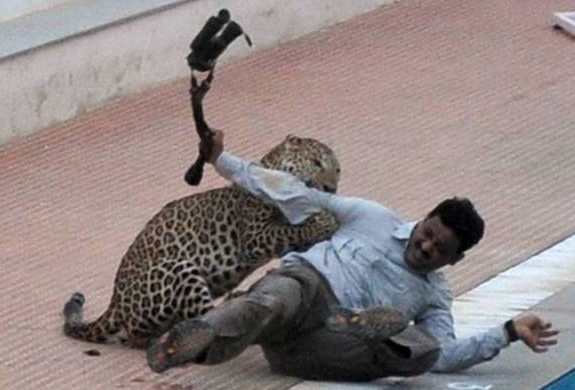
And in Rajganj, the leopard ended up injuring 35 people and another incident in Mumbai where I live a two-year-old kid was attacked by the big cat. I never head the big cat attacking any dogs or maybe the media doesn't report it. But if what you're saying is true, and they prey on dogs which help in eliminating rabies and other diseases then it's assuring. That works for me. Thank you for sharing this information.
Yeah, they can be really dangerous! I'm glad to hear that no children were harmed when it entered the school.
It's a big problem when the leopards live close to people like this, but as the paper states, it should be a net benefit to human survival because it is important for keeping diseases at bay. It might seem strange to see claims like these when 35 people were injured in an attack, but keep in mind that some of the diseases such as rabies can harm a lot more people from a few infected individuals.
Thanks for a great comment, @akshayb!
I'm glad to know that too. But in the scale of diseases and human life, life is more precious. However, Rabies should be tackled by the animal welfare at the very first stage.
Good point. Yeah, human lives are a lot more important, but keep in mind that some diseases also can lead to death as well.
Certainly
I agree with you that in first few lines, no doubt, soooooo pretty Indian leopard ^_^
And where are you @valth in previous days? I see you after many days....
Hey, @sanach. Yeah, it is really beautiful!
I had to take the weekend away to relax and not worry about Steemit for a while ;) It can get very intense to write a post every day! I wrote a post about my absense if you want to check it out.
Best regards from @valth
Alright! I'll be check, Yeah! I can understand, It's really hard for you... but don't worry :)
@sanach
I read stories about how reintroducing wolves into Yellowstone National Park changed the flow of the river and produced many beneficial changes. Here's a video from the BBC on the topic if you're interested.
Hi, @theinsideout!
I was actually thinking about including this information in the original post, but decided to not do it in order to keep it from being too long. But it's really interesting how having more predators around can change even the abiotic factors of a region!
I can't see the video you talk about, but I know of it, so here it is if anyone else wants to check it out:
Thanks, I thought I posted the link, but I don't see it either. I must have failed to copy it. Thanks for adding this video!
You're welcome :) It's a really interesting video that I hope other people who read the comment check out!
Looking very dangerous
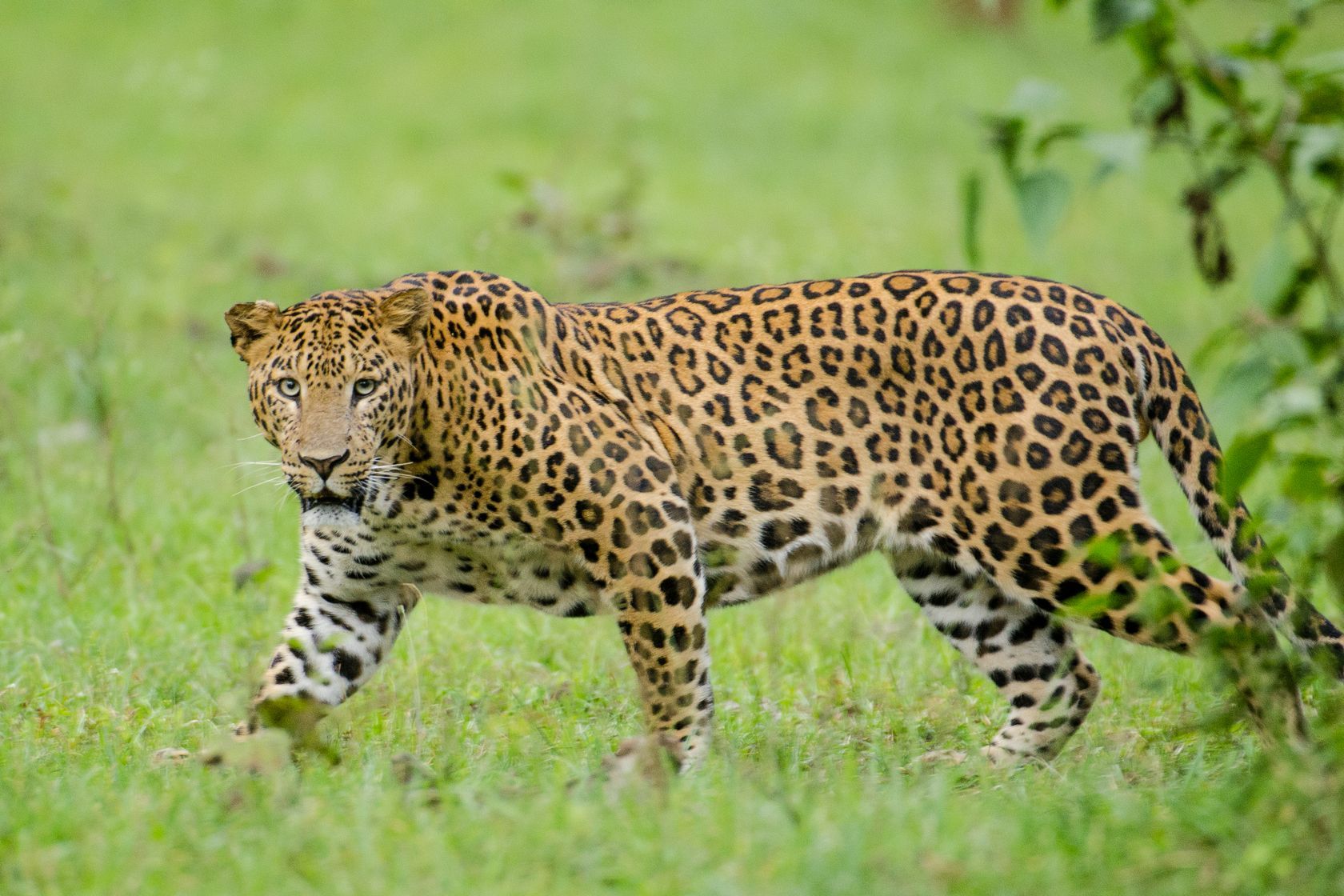
Yeah, that's true. It also is pretty dangerous, but it still gives us humans higher survival rates compared to not having it ;)
nice natural view. I like tiger and dog.
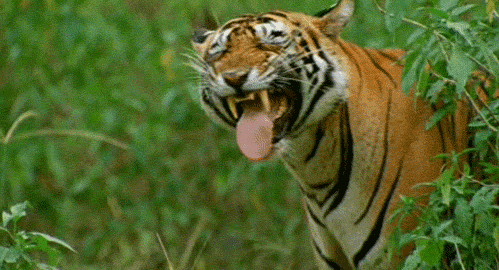

indeed the input of your post is very good, I like with your post may be useful for others.
Thank you :)